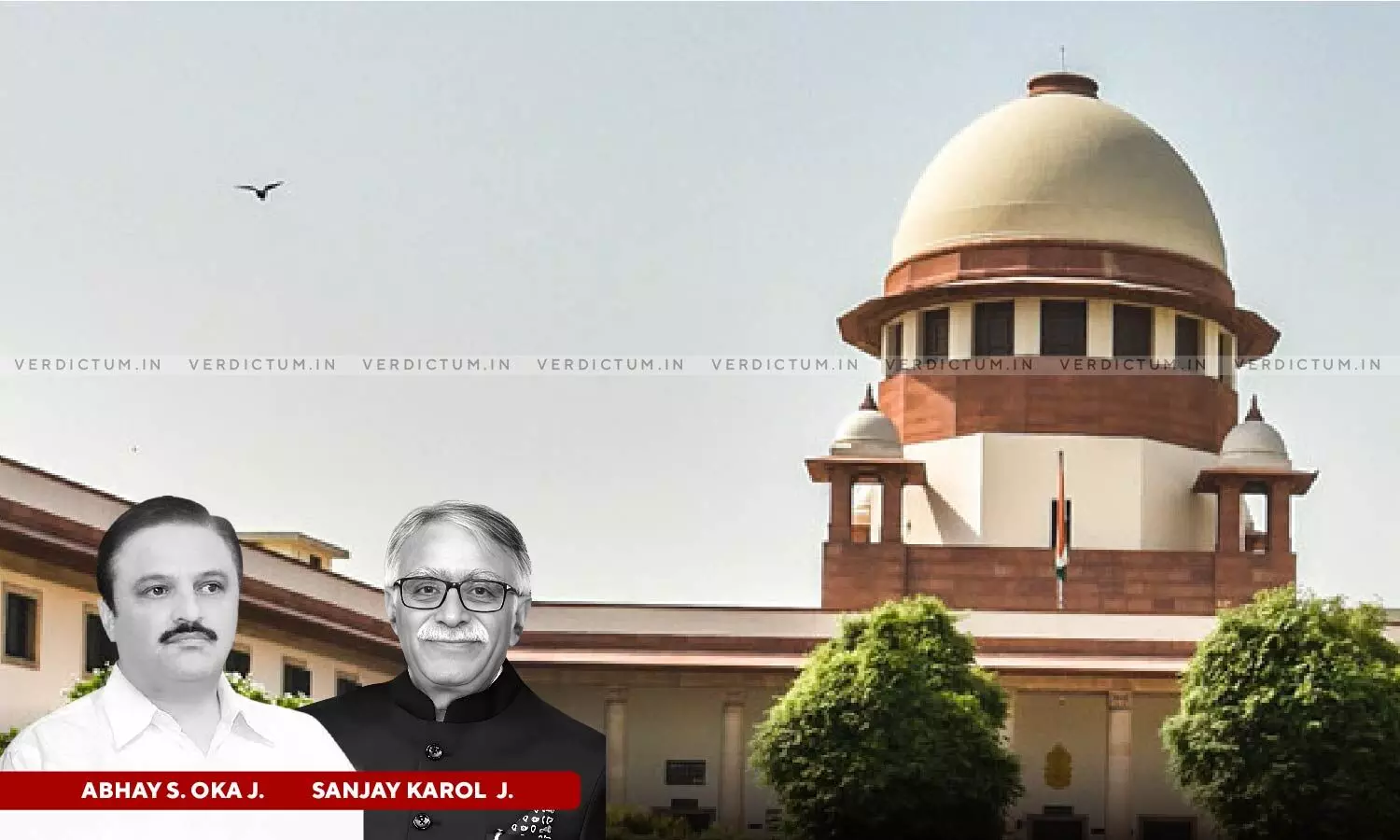
Finance Act | Assessee Cannot Be Subjected To Penalty Based On Show Cause Notice Containing Incorrect Service Category: SC
 |
|The Supreme Court dismissed the appeal filed by the Commissioner of Service Tax (Commissioner) against the order of the Custom, Excise, and Service Tax Appellate Tribunal (Tribunal). The Commissioner sent four show-cause notices to a software company (Assessee), wherein the first show-cause notice was marked under the wrong category.
The Court held that the principle of natural justice requires that adjudication be made only based on the classification of the notice. Therefore, the Assessee cannot be penalized for a notice containing an entirely incorrect service category.
The Bench headed by Justice Abhay S. Oka and also comprising Justice Sanjay Karol observed, “Therefore, CESTAT was right in holding that the first show cause was illegal. Elementary principles of natural justice required that the adjudication on the basis of show cause notice should be made only on the basis of classification stated in the show cause notice. Assessee cannot be subjected to a penalty on the basis of a show cause notice containing a completely erroneous category of service”.
Additional Solicitor General N. Venkatraman appeared for the Appellant/Commissioner and Advocate Mukesh Kumar Maroria appeared for the Respondent/Assessee.
The first notice covered the period from April 2004 to March 2009 and demanded service tax for the taxable service of 'Maintenance & Repair'. The second, third, and fourth notices covered the periods from April 2009 to March 2010, April 2010 to March 2011, and April 2011 to April 2012, respectively, and demanded service tax for the service of 'Information Technology Software'. The Custom, Excise, and Service Tax Appellate Tribunal (Tribunal) remanded the matter to the commissioner for reconsideration.
The Commissioner then classified the services rendered by the company from April 2004 to May 2008, as 'Intellectual Property Service'; from May 2008, onwards, the classification of service rendered concerning software should be under the category of 'Information Technology Software'. Additionally, the value of the computer hardware items consumed for providing the services must be included in the respective services' valuation in Section 67 of the Finance Act. Thereafter, the Assessee challenged the order-in-original before the Tribunal, which held that the subject matter of dispute was classifiable under the category of "Information Technology Software" with effect from May 2008, and for the earlier period up to May 2008, the same services were classifiable under the category of "Intellectual Property Service".
The Tribunal, therefore, held that the first show cause notice was not justified. The Commissioner and the Assessee approached the Apex Court challenging the order of the Tribunal.
The Supreme Court determined that the Tribunal's decision to declare the first show cause notice unlawful was correct, and the demand based on that notice was also unlawful. The Court reviewed the three show cause notices and noted that they were correctly classified. The Court recognized that the prior order which was remanded for further consideration did not determine the matter and noted that the key question to be determined was whether the specified classification required payment of service tax.
“Now, we come to the other three showcause notices. We have carefully perused the findings recorded by CESTAT. As stated earlier, the other three showcause notices mentioned the correct classification. Reliance is placed on the earlier order of remand passed by CESTAT. However, we find that said order of remand does not decide any issue on merits and therefore, after the remand, the issue was wide open. The issue to be considered was whether in respect of the particular transactions, service tax was payable under the classification mentioned in the show cause notices. After having perused the findings of CESTAT, we find that the findings rendered by the Tribunal call for no interference. The findings are based on careful consideration of the factual and legal aspects”, the Bench observed.
The Court held that the Tribunal’s findings were correct regarding an exemption available under the Special Economic Zones Act, 2005 (SEZ Act) for services supplied to SEZ units under Subsection (2) of Section 26. The provision laid down the manner and terms of exemptions to be granted to developers or entrepreneurs covered by subsection (1) of Section 26.
The Court asserted that the SEZ Act supersedes other enactments that are inconsistent with its provisions under Subsection (1) of Section 51. Therefore, the Court emphasised that an exemption can only be claimed when the Central Government grants it through the exercise of the power under Subsection (2) of Section 26 of the SEZ Act. The Court held that the octroi charges cannot be considered part of the taxable services because they are essentially a fee for transporting goods.
The Bench noted, “Under Subsection (1) of Section 51, SEZ Act prevails over other enactments which are inconsistent to the provisions contained therein. Thus, only when by exercising the power under subsection (2) of Section 26 of SEZ Act, an exemption is granted by the Central Government that the assessee can claim exemption. Otherwise, the exemption notification referred in paragraph 10.16 will apply”.
Accordingly, the Court dismissed the Appeals.
Cause Title: Commissioner of Service Tax, Mumbai v. M/s 3I Infotech Ltd. (2023 INSC 711)